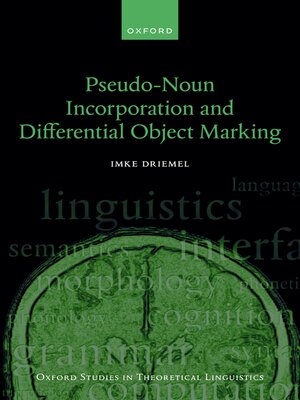Pseudo-Noun Incorporation and Differential Object Marking
ebook ∣ Oxford Studies in Theoretical Linguistics
By Imke Driemel

Sign up to save your library
With an OverDrive account, you can save your favorite libraries for at-a-glance information about availability. Find out more about OverDrive accounts.
Find this title in Libby, the library reading app by OverDrive.



Search for a digital library with this title
Title found at these libraries:
| Library Name | Distance |
|---|---|
| Loading... |
This book provides a detailed cross-linguistic study of pseudo-noun incorporation, a phenomenon whereby an argument forms a 'closer than usual' relation with the verb. Imke Driemel draws on data from Tamil, Mongolian, Korean, Turkish, and German, and applies diagnostic tests across eleven noun types in each of the languages under consideration. What emerges is a coherent effect of pseudo-incorporated arguments that maps loss of case marking to obligatory narrow scope, lack of binding and control relations, and a potentially restricted movement pattern. The book provides a unifying theory that is able to capture all properties with a single assumption: pseudo-incorporation effects result from noun phrases that are made up of a nominal and a verbal category feature; implemented in a derivational framework, the nominal feature is active early in the derivation, being responsible for c-selection and nominal modification, while the verbal feature is active late and crucially derives the effects we have come to recognize as pseudo-noun incorporation. One important empirical contribution of this study stems from the observation that pseudo-incorporation does not have to be the only reason for optional case marking. Tamil and Korean provide evidence that only a subset of optionally case-marked noun types also show a correlation with scope, binding, control, and movement constraints. This insight enforces the conclusion that the same language can make use of both pseudo-noun incorporation and differential object marking.







